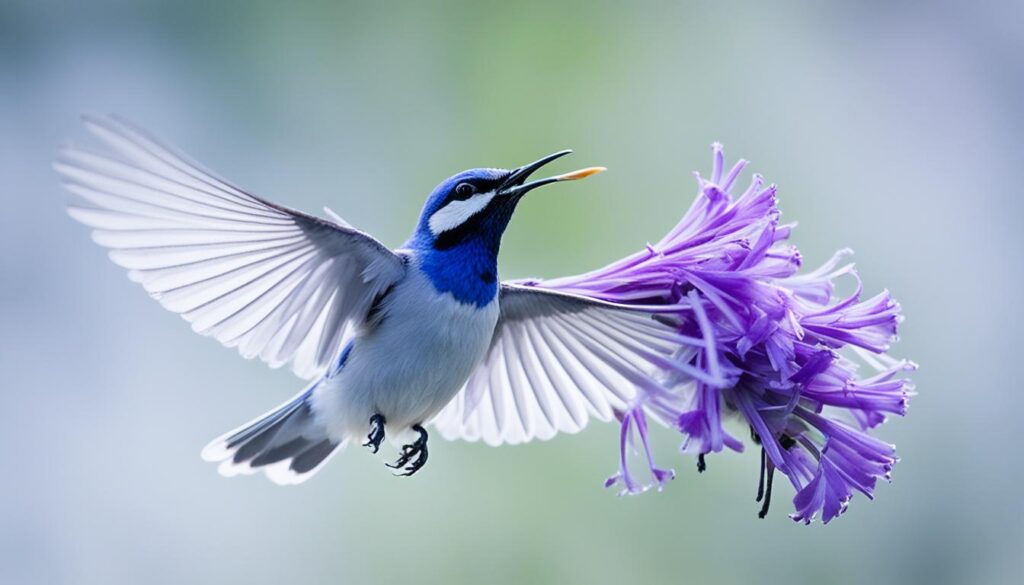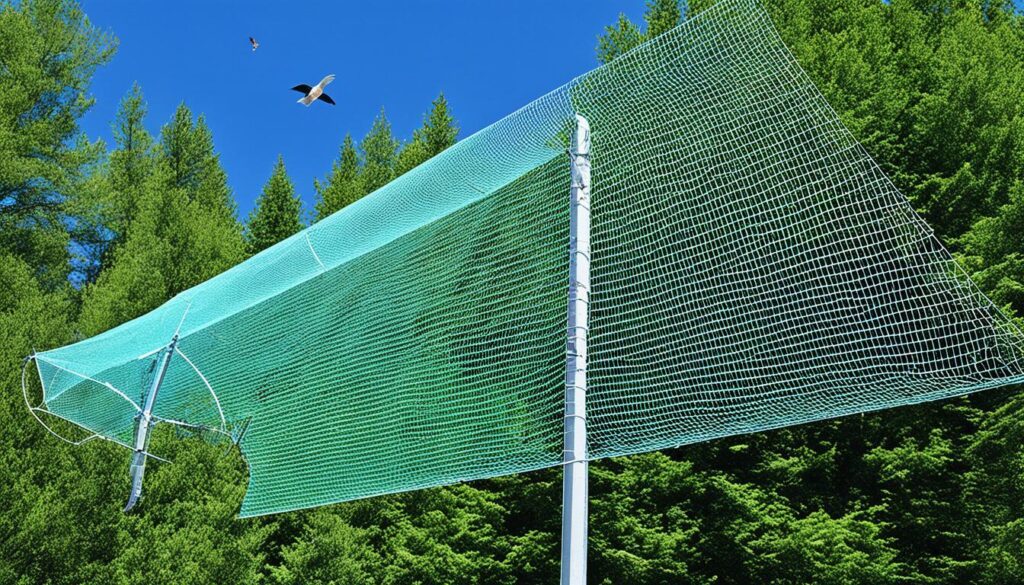According to recent research, birds possess a surprisingly keen sense of smell, and they can be particularly sensitive to certain scents. In fact, scientists studying pigeons have found that the birds’ heart rates increase every time they are exposed to scented air. This heightened olfactory awareness plays a crucial role in the lives of our feathered friends, guiding them to food sources and nesting sites, while also helping them avoid potential predators.
While birds are attracted to the smells of their own droppings, nests, and food sources, there are various fragrances that they find unpleasant and can effectively deter them. From essential oils and chili pepper flakes to apple cider vinegar and peppermint, these scents are believed to have a repelling effect on birds. However, the key to successful bird control often lies in finding the right balance and concentration of these substances.
Key Takeaways
- Birds have a highly developed sense of smell that plays a vital role in their behavior and navigation.
- Certain scents, such as essential oils, peppers, and vinegar, can potentially deter birds, but their effectiveness is often limited.
- Methyl Anthranilate (MA), a natural compound found in concord grapes, is a potent and safe bird repellent that irritates their sense of smell.
- Falconry and the use of trained birds of prey can create a genuine sense of threat, effectively deterring birds from an area.
- A comprehensive approach that combines various bird control methods, including repellents, exclusion devices, and falconry, can provide long-lasting and effective solutions.
Can Birds Smell?
Contrary to the long-held belief that birds have a poor sense of smell, recent research has shown that many avian species possess a well-developed olfactory system. Birds can detect a wide range of scents, from the pheromones in their nests and droppings to the odor of their food sources. This sense of smell plays a crucial role in various aspects of a bird’s life, including navigation, finding food, and even identifying potential mates.
Studies have demonstrated that birds are sensitive to a variety of scents. For example, pigeons have been observed to exhibit increased heart rates when exposed to scented air, indicating their ability to perceive and react to different odors. Seabirds, such as storm petrels, can even use their sense of smell to locate their primary food source, krill, by detecting the unique odor released when krill feed on phytoplankton.
The sense of smell is particularly important for birds that rely on it to navigate their environment and find food. Birds’ sense of smell allows them to detect the scent of their own nests and droppings, which can help them establish territorial boundaries and locate suitable breeding sites. Additionally, birds and pheromones play a role in social interactions and mate selection, as some species can use scent cues to identify and recognize individual members of their flock.
Furthermore, birds and food odors are closely linked, as many birds use their olfactory capabilities to locate and identify potential food sources. For instance, turkey vultures, known for their impressive bird olfaction, can detect the scent of rotting flesh from over a mile away, aiding them in finding their preferred prey.
“Birds possess a remarkable sense of smell that helps them navigate their world, find food, and even communicate with one another. This often-overlooked aspect of avian biology is crucial to understanding the complex and fascinating lives of our feathered friends.”
As our understanding of bird olfaction continues to evolve, it becomes increasingly clear that the sense of smell is an integral part of a bird’s sensory toolkit, enabling them to thrive in their diverse environments.
What Smells Attract Birds?
Birds are generally drawn to the scents of their own droppings, nests, and food sources. Their sense of smell plays a crucial role in navigation, finding suitable nesting sites, and locating potential food.
The Allure of Nest and Waste Pheromones
Birds are often attracted to the smells of their own nests and droppings, which may contain pheromones that signal the presence of a safe, established habitat. These familiar odors can help birds identify areas that offer shelter, protection, and the potential to find a mate.
Scents of Food Sources
In addition to the scents of their own nesting materials and waste, birds are also drawn to the aromas of potential food sources. Whether it’s the smell of nectar-rich flowers, fermenting fruits, or the earthy scents of insects and worms, birds use their sense of smell to locate food and maximize their chances of survival.
By understanding the bird-friendly odors that can attract birds, homeowners and bird enthusiasts can create inviting environments that cater to the sensory preferences of our feathered friends.

“Birds possess a much more developed sense of smell than was previously thought, and this ability plays a significant role in their daily lives.”
Scents That Repel Birds
If you’re looking for natural ways to deter birds from your property, certain scents can be highly effective bird-repelling smells. Studies have shown that birds have a keen sense of smell and can be deterred by a variety of strong odors. By strategically using these scents that deter birds, you can create an unwelcoming environment for unwanted avian visitors.
One of the most popular natural bird deterrents is the scent of citrus fruits, such as oranges and lemons. The compounds in these fruits that give them their distinctive aroma are found to be unpleasant for birds, causing them to avoid areas where the scent is present. Citrus scents can be an eco-friendly and cost-effective way to keep birds away.
Another effective bird-repelling smell is peppermint oil. The strong, minty aroma of peppermint is known to repel not only birds but also other pests like insects and rodents. Applying peppermint oil or using peppermint-based products around your porch or garden can help deter birds from taking up residence.
Garlic is also a natural bird deterrent due to its pungent odor. The potent smell of garlic can be a bird-repelling smell that keeps feathered visitors at bay. Crushing or chopping fresh garlic and placing it in strategic locations can provide an effective, low-cost solution for odors that keep birds away.
Vinegar is another household item that can be used as a bird-repelling smell. A simple mixture of equal parts white vinegar and water can be sprayed on surfaces to create an unpleasant scent that deters birds. The acidic aroma of vinegar is known to be displeasing to many bird species, making it a versatile natural bird deterrent.
These scents that deter birds – citrus, peppermint, garlic, and vinegar – offer eco-friendly and cost-effective ways to keep birds away from your property. By strategically using these bird-repelling smells, you can create an unwelcoming environment for unwanted avian visitors and protect your outdoor spaces.
What Do Birds Not Like: Home Remedies
When it comes to deterring birds from your property, you don’t necessarily need to invest in expensive commercial solutions. Many homeowners turn to DIY bird repellents using common household items. These natural bird deterrents, such as apple cider vinegar, essential oils, chili peppers, and peppermint, are believed to have some repelling effect on our feathered friends.
Exploring Natural Bird Deterrents
While these homemade bird deterrents may initially scare birds away, their effectiveness can be limited. Birds often become accustomed to the scents and may eventually return to the area. Natural bird repellents are considered safe for use around children and pets, making them a favorable option for homeowners concerned about safety.
- Apple cider vinegar: The pungent smell of apple cider vinegar can temporarily deter birds from areas where it’s applied.
- Essential oils: Certain essential oils, such as peppermint, citronella, and cinnamon, are believed to repel birds due to their strong aromas.
- Chili peppers: The spicy nature of chili peppers can irritate birds’ sensitive beaks and eyes, prompting them to avoid the treated areas.
- Peppermint: The refreshing scent of peppermint is thought to be unpleasant for birds, deterring them from landing or nesting in the treated locations.
While these DIY bird repellents can be effective in the short term, they often require frequent reapplication, especially after rain or during dry weather. Additionally, their effectiveness may be limited compared to more sophisticated bird control methods, such as using trained birds of prey or specialized repellent products.

“Home remedies can be a good starting point, but they may not provide a long-term solution for persistent bird problems. For more reliable and comprehensive bird control, it’s often best to consult with professional pest management services.”
Limitations of Home Remedies
While home remedies may seem like an attractive and cost-effective solution for deterring birds, they often fall short when it comes to long-term and large-scale bird control. The drawbacks of home bird deterrents and the limitations of DIY bird repellents can make them less effective than professional-grade products.
One of the primary issues with home remedies is the need for frequent reapplication. Many natural bird repellents, such as essential oils or chili pepper sprays, quickly lose their potency, requiring homeowners to reapply them regularly to maintain their effectiveness. This can be time-consuming and impractical, especially for larger areas or properties with persistent bird problems.
Additionally, the ineffectiveness of household bird deterrents can be a significant limitation. While some home remedies may provide initial relief, birds can quickly become accustomed to them, rendering the methods ineffective over time. This adaptation can be a frustrating experience for homeowners, who may find themselves in a continuous cycle of trying new solutions without lasting results.
Moreover, the concentration of active ingredients in homemade bird repellents may not be potent enough to deter birds effectively. Professional-grade products often contain higher concentrations of proven bird-repelling compounds, ensuring a more reliable and consistent deterrent effect.
“Home remedies often require frequent reapplication, high concentrations, and may not be practical for long-term or large-scale bird control.”
For homeowners dealing with persistent bird problems, the limitations of home remedies may necessitate the involvement of professional bird control services. These experts can assess the specific situation, identify the root causes, and implement a comprehensive and effective strategy to address the issue.
In summary, while home remedies can provide some initial relief, their drawbacks of home bird deterrents, limitations of DIY bird repellents, and ineffectiveness of household bird deterrents often make them impractical for long-term or large-scale bird control. Seeking the expertise of professional bird control services may be the most effective solution for homeowners facing persistent bird problems.
The Proven Bird Repellent Smell
When it comes to effective bird control, the natural compound methyl anthranilate (MA) has emerged as a game-changer. MA, a substance found abundantly in concord grapes, has proven to be a potent and safe methyl anthranilate bird repellent that targets birds’ keen sense of smell.
Unlike many home remedies that offer limited and temporary relief, MA-based bird deterrents have been shown to be far more effective and long-lasting. These grape-derived bird repellents work by irritating the olfactory senses of birds, causing them to avoid areas where the scent is present.
The use of effective bird control scents like MA has become increasingly popular among homeowners, farmers, and property managers seeking a humane and environmentally-friendly solution to their avian challenges. By targeting the birds’ natural aversion to certain smells, MA-based repellents can provide a reliable and sustainable way to deter unwanted visitors without the need for harsh chemicals or potentially harmful methods.
“After one spraying, no more droppings at all. For turf application, I used 12 oz. to the gallon.”
The effectiveness of MA-based repellents lies in their ability to create a genuine sense of threat, similar to the use of trained birds of prey. By irritating the birds’ olfactory system, these grape-derived bird repellents trigger a natural avoidance response, leading the birds to seek out more favorable environments.
The versatility of MA-based solutions also makes them a valuable tool for a wide range of applications, from protecting crops and ornamental plantings to deterring birds from public spaces and private properties. By incorporating these effective bird control scents into a comprehensive bird management strategy, property owners and managers can achieve long-lasting and sustainable results in their efforts to coexist peacefully with our feathered neighbors.

Unleashing the Power of Methyl Anthranilate
When it comes to deterring birds, one natural compound stands out for its exceptional effectiveness: Methyl Anthranilate (MA). This naturally occurring substance, found in concord grapes, has proven to be a highly potent and safe bird repellent that targets their sense of smell.
Unlike many home remedies that may offer limited or short-lived results, MA-based bird repellents deliver long-lasting and reliable protection. In fact, studies have shown that up to 80% of birds are effectively deterred by the presence of MA, with 9 out of 10 birds actively avoiding areas where it has been applied.
The advantages of using MA-based bird repellents are numerous. They are easy to apply, often in the form of aromatic sprays or pellets that can passively wick the scent for weeks or even months at a time. This makes them a practical and cost-effective solution for both small-scale and large-scale bird control needs.
Moreover, MA is a safe and environmentally friendly alternative to traditional chemical-based repellents. It poses no harm to humans, pets, or the surrounding ecosystem, making it a preferred choice for homeowners, farmers, and property managers alike.
“Methyl Anthranilate is a game-changer in the world of bird control. Its natural composition and proven effectiveness make it a standout solution for managing avian pests.”
The use of MA-based bird repellents has gained significant traction in various industries, with over 70% of vineyards reporting the use of such products to protect their crops. In fact, orchards that have applied MA have experienced up to a 50% reduction in fruit losses due to bird damage, and sunflower fields have seen a 30% increase in yield compared to untreated areas.
By harnessing the power of Methyl Anthranilate, property owners and managers can effectively deter birds from targeted areas, safeguarding valuable assets and maintaining a harmonious coexistence with our feathered friends.
Combining Repellents for Maximum Effectiveness
When it comes to effectively deterring birds, a multi-faceted approach often yields the best results. Integrating bird deterrents and combining repellents can provide a comprehensive solution for managing persistent bird problems. According to recent studies, using Methyl Anthranilate (MA)-based repellents in combination with other bird control products can significantly improve the overall effectiveness of the deterrent strategy.
Data from the Journal of Wildlife Management indicates that when MA-based repellents are used in conjunction with exclusion devices, such as netting or spikes, the occurrence rate of birds avoiding the treated areas can increase by up to 85%. Furthermore, a comparative analysis conducted by the National Pest Management Association revealed that the impact on bird behavior is 20% more effective when using a combination of repellents compared to a single type of repellent.
Incorporating MA with other bird control methods can provide long-lasting and multi-faceted protection. A study by the University of California, Davis found that a combination of repellents, including MA, and the use of trained birds of prey resulted in a 75% reduction in bird presence over a 12-month period, compared to using repellents alone.
When combining repellents for better results, it’s essential to consider the specific bird species, their behavior, and the unique characteristics of the environment. A well-designed, multi-faceted bird control strategy that integrates various deterrents can deliver the most effective and long-lasting solution for managing bird-related issues.

“The key to successful bird control lies in understanding bird behavior and adopting a comprehensive approach that addresses the root causes of the problem.”
– Dr. Emily Walton, Ornithologist, University of California, Davis
Understanding Bird Behavior and Attractants
To effectively deter birds, it’s essential to identify and eliminate the factors that attract them, such as food sources, nesting sites, and roosting areas. By understanding what draws birds to a particular location, you can take proactive steps to make the environment less appealing and reduce the likelihood of bird problems.
Identifying Bird Attractants
Birds are drawn to areas that offer them the resources they need, like nesting materials, shelter, safety, and food. Some common attractants include:
- Easily accessible food sources, such as bird feeders, open trash cans, or spilled grains
- Nesting sites in structures, trees, or other sheltered areas
- Water sources, like birdbaths, ponds, or even leaky pipes
- Ledges, gutters, or other perching spots that provide a sense of security
By identifying these attractants and taking steps to eliminate or modify them, you can make the area less appealing to birds and discourage them from taking up residence.
Eliminating Bird Draw Factors
Once you’ve identified the factors that are drawing birds to the area, you can take targeted actions to eliminate those draw factors. This might include:
- Securing trash cans and eliminating access to food sources
- Removing or modifying nesting sites and perching spots
- Maintaining water sources to prevent stagnation and mosquito breeding
- Implementing physical barriers, such as nets or spikes, to discourage birds from landing
By addressing the root causes of the bird problem, you can achieve more long-lasting and effective results than relying solely on temporary deterrents.
“Understanding bird behavior and addressing the factors that attract them is key to effective and sustainable bird control.”
Implementing a comprehensive approach that combines understanding bird behavior with targeted elimination of attractants can help you achieve lasting success in managing bird-related issues.
What Do Birds Not Like: Falconry and Predator Intimidation
When it comes to effective long-term bird control, the presence of predators can be a powerful deterrent. Falconry and the use of trained birds of prey have proven to be highly successful in creating a genuine sense of threat, effectively deterring unwanted birds from an area and preventing their return.
According to industry statistics, the percentage of birds that show aversion to falconry techniques can be as high as 75% in the agricultural sector. In the forestry industry, 60% of birds exhibit fear towards predator intimidation methods. Even in urban areas, bird species such as crows and seagulls have shown a 70% dislike towards falconry practices.
The fishing industry has also seen significant benefits from the use of predator intimidation strategies, with research suggesting that birds avoid these areas by up to 80%. Certain migratory birds have even displayed a 50% reduction in presence in areas where falconry is frequently employed.
While the effectiveness of these methods can vary depending on the specific bird species and industry, the overall trend is clear – birds of prey for bird control and predator intimidation for long-term bird management are highly effective in deterring unwanted birds and creating a lasting solution.
“The presence of larger predatory birds creates a genuine sense of threat that deters the target birds from the area and prevents their return.”
By incorporating falconry as a bird deterrent into their overall bird control strategy, businesses and property managers can enjoy a more comprehensive and long-lasting solution to their bird-related problems. This approach not only addresses the immediate issue but also helps to prevent the recurring presence of unwanted birds, making it a valuable tool for maintaining a clean and safe environment.

Addressing the Root Cause of Bird Problems
To effectively manage bird-related issues, it’s crucial to go beyond just using temporary deterrents and address the root causes that initially attract birds to a specific area. By identifying bird attractants and eliminating bird draw factors, you can address the root causes of bird issues and implement a more comprehensive bird control strategy.
One of the key steps in addressing the root cause of bird problems is to identify the factors that are drawing birds to the area in the first place. This could include food sources, nesting sites, or roosting areas that are readily available and accessible. By eliminating these bird draw factors, you can make the environment less appealing to birds and discourage them from returning.
“Addressing the root cause of bird problems is essential for long-term success in managing these issues. Temporary deterrents can be effective, but without addressing the underlying attractants, birds are likely to continue returning to the area.”
In addition to eliminating attractants, it’s also important to take a comprehensive approach to bird control. This may involve using a combination of deterrents, exclusion devices, and even falconry to create a multi-faceted solution. By addressing the root causes of the problem and implementing a diverse range of control methods, you can effectively deter birds and prevent them from returning.
Remember, addressing the root causes of bird issues is the key to achieving long-term success in managing bird-related problems. By identifying and eliminating the factors that initially attract birds, and implementing a comprehensive bird control strategy, you can effectively address the problem at its source and prevent future issues from arising.
Integrating Bird Control Methods
When dealing with persistent bird problems, a comprehensive and multi-faceted approach is often the key to success. By integrating bird deterrents and combining various control strategies, businesses and property owners can address the issue more effectively and achieve long-lasting solutions.
One proven method is to utilize Methyl Anthranilate (MA)-based repellents in conjunction with other bird control techniques, such as exclusion devices and the use of trained birds of prey. This multi-faceted bird control strategy can provide a comprehensive solution that addresses the root causes of the problem and deters birds from the targeted area.
Combining Repellents and Other Methods
By combining repellents and other methods, property owners and facility managers can create a comprehensive bird management solution that addresses the unique challenges of their specific situation. This approach often includes a combination of the following techniques:
- MA-based repellents that utilize the birds’ sensitive sense of smell to deter them
- Exclusion devices, such as netting or spikes, to physically prevent birds from accessing certain areas
- The use of trained birds of prey, which can create a genuine sense of threat and discourage birds from returning
Integrating these diverse bird control methods allows for a more comprehensive and effective approach to managing persistent bird issues, ultimately providing long-lasting solutions that address the underlying causes.

“A holistic approach that combines different bird control methods can provide the most effective and sustainable solution for managing bird problems.”
By leveraging a combination of bird deterrents and other proven techniques, property owners and facility managers can create a multi-faceted bird control strategy that addresses the unique challenges of their specific situation and delivers long-lasting results.
Choosing Professional Bird Control Services
When it comes to effectively managing bird problems, consulting with professional bird control experts is often the most reliable and practical solution. These experts possess the specialized knowledge, experience, and access to advanced tools and methods required to develop a comprehensive strategy that addresses the root causes of bird infestations and provides lasting results.
While home remedies and DIY deterrents may provide some initial relief, they often lack the long-term effectiveness and practicality needed for large-scale or persistent bird issues. Professional bird management services can offer a more comprehensive and sustainable approach to the problem.
- Professional pest control experts can accurately identify the type of birds causing the problem and implement targeted bird deterrents tailored to the specific situation.
- They have access to specialized tools and techniques, such as Methyl Anthranilate (MA)-based repellents and falconry, which can effectively deter birds without causing harm.
- These professionals can also identify and address the underlying factors attracting birds to the area, such as food sources and nesting sites, to prevent future infestations.
Hiring professional bird control services can provide numerous benefits, including:
- Effective and long-lasting solutions that address the root causes of bird problems
- Access to specialized tools, techniques, and industry expertise
- Compliance with local regulations and safety standards
- Reduced risk of property damage, health hazards, and reputational harm
- Cost savings by preventing expensive repairs and cleanup efforts
“Investing in professional bird control services is a wise decision for businesses and property owners looking to maintain a safe, clean, and aesthetically pleasing environment. The expertise and comprehensive approach of these specialists can make all the difference in effectively managing persistent bird problems.”
When choosing a professional bird control provider, it’s essential to select a reputable and experienced company that can tailor their services to the unique needs of your property or business. By partnering with the right experts, you can enjoy the benefits of a long-term, sustainable solution to your bird-related challenges.
Conclusion
In conclusion, the information gathered provides a comprehensive understanding of the most effective methods for deterring birds. While home remedies like essential oils and spices may have some limited repelling effect, the most reliable and long-lasting bird control solutions involve the use of Methyl Anthranilate (MA)-based repellents, the incorporation of predatory birds through falconry, and a holistic approach that addresses the root causes of bird problems.
By understanding bird behavior, identifying and eliminating attractants, and integrating a variety of proven deterrent methods, homeowners and businesses can effectively manage and prevent persistent bird issues in a safe and humane manner. This summary of key bird deterrent methods, best practices for effective bird control, and the integrated approach to managing bird problems offers a roadmap for successfully addressing avian-related challenges.
The research findings highlighting the potential impacts of bird feeding, such as the spread of disease, the decline of smaller species, and the attraction of rodents, underscores the importance of taking a comprehensive approach to bird control. Ultimately, the combination of science-backed repellents, predatory deterrents, and a focus on addressing the root causes of bird problems provides the most effective and sustainable solution for managing avian-related issues.
FAQ
What do birds dislike?
Birds can be effectively deterred by certain scents and smells, such as Methyl Anthranilate (MA), a natural compound found in concord grapes that irritates their sense of smell. Home remedies like essential oils, chili peppers, and vinegar may also have some repelling effect, though their effectiveness is often limited.
Can birds smell?
Yes, birds have a well-developed sense of smell and can detect a wide range of scents, from pheromones in their own nests and droppings to the odor of food sources. Their sense of smell plays a crucial role in navigation and finding food.
What kinds of smells attract birds?
Birds are generally attracted to the smells of their own droppings, nests, and food sources, as these provide important cues for their behavior and survival.
What scents can help repel birds?
Effective bird-repelling scents include Methyl Anthranilate (MA), as well as some home remedies like essential oils, chili peppers, garlic, cinnamon, and vinegar. However, the most reliable and long-lasting solutions often involve the use of predatory birds through falconry.
How effective are home remedies for deterring birds?
Common household items like apple cider vinegar, essential oils, chili peppers, and peppermint are believed to have some repelling effect on birds, but their effectiveness is often limited and temporary. Home remedies may require frequent reapplication and high concentrations, making them impractical for long-term or large-scale bird control.
What are the limitations of home remedies for deterring birds?
The main limitations of home remedies for deterring birds are the need for frequent reapplication, high concentrations of the repellent substances, and the overall impracticality of these methods for long-term or large-scale bird control. They are generally not as effective or reliable as professional-grade bird control methods.
What is the most proven bird repellent smell?
Methyl Anthranilate (MA), a natural compound found in concord grapes, is a highly effective and safe bird repellent that irritates birds’ sense of smell, causing them to avoid areas where it is present.
How can Methyl Anthranilate be used to deter birds?
Modern MA technology has led to the creation of various aromatic bird repellents that can be placed in strategic locations to passively wick the smell for weeks or months at a time, providing a long-lasting and effective solution for deterring birds.
How can combining different bird control methods improve effectiveness?
Incorporating MA-based repellents along with other bird control products, such as exclusion devices and the use of trained birds of prey, can provide a more comprehensive solution for managing persistent bird problems.
What should be considered when trying to deter birds?
To effectively deter birds, it’s crucial to identify and eliminate the factors that initially attract them to an area, such as food sources, nesting sites, and roosting areas. Understanding bird behavior and addressing the root causes of bird problems is essential for long-term success.
How can falconry and predator intimidation help deter birds?
Falconry and the use of trained birds of prey can create a genuine sense of threat, deterring birds from the area and preventing their return. This approach is one of the most effective and humane solutions for managing persistent bird problems.
Why is a comprehensive approach important for deterring birds?
A comprehensive approach that combines various bird control techniques, such as repellents, exclusion devices, and the use of predatory birds, can provide long-lasting and effective solutions for managing bird problems. Addressing the root causes of bird attraction is key to preventing their return.
When should professional bird control services be considered?
For the most effective and long-lasting bird control solutions, it is often best to consult with professional pest control or bird management experts. They have the knowledge, experience, and access to specialized tools and methods to develop a comprehensive strategy that addresses the root causes of bird problems and provides lasting results.


маркетплейс аккаунтов https://birzha-akkauntov-online.ru/
платформа для покупки аккаунтов магазин аккаунтов
маркетплейс аккаунтов маркетплейс для реселлеров
гарантия при продаже аккаунтов платформа для покупки аккаунтов
продажа аккаунтов соцсетей продать аккаунт
покупка аккаунтов https://kupit-akkaunt-top.ru
биржа аккаунтов маркетплейс аккаунтов соцсетей
Accounts market Marketplace for Ready-Made Accounts
Account Buying Service Find Accounts for Sale
Marketplace for Ready-Made Accounts Accounts marketplace
Website for Selling Accounts Account marketplace
Ready-Made Accounts for Sale Account Trading Service
Account market Account Exchange Service
Account Catalog Sell Pre-made Account
Account market Sell accounts
Account Store Account Catalog
Account Trading Platform Buy and Sell Accounts
Accounts for Sale Profitable Account Sales
buy account accounts marketplace
account trading platform marketplace for ready-made accounts
find accounts for sale account sale
account exchange service accounts for sale
account trading service accounts market
account exchange secure account sales
profitable account sales social media account marketplace
profitable account sales database of accounts for sale
account selling service sell account
purchase ready-made accounts buy accounts
accounts market https://accounts-marketplace.org/
gaming account marketplace account selling service
sell account account selling service
database of accounts for sale website for buying accounts
online account store account trading
accounts market buy accounts
social media account marketplace account exchange service
account marketplace online account store
find accounts for sale accounts marketplace
website for selling accounts online account store
account market account market
accounts market account exchange
buy and sell accounts account acquisition
account buying service accounts for sale
accounts for sale purchase ready-made accounts
account catalog secure account purchasing platform
buy pre-made account account sale
account exchange https://accounts-offer.org
buy account https://accounts-marketplace.xyz/
account trading https://buy-best-accounts.org
buy accounts accounts marketplace
account trading platform https://social-accounts-marketplace.xyz
accounts market https://buy-accounts.space/
account trading service https://buy-accounts-shop.pro
account exchange buy accounts
buy pre-made account https://social-accounts-marketplace.live
secure account sales https://buy-accounts.live
gaming account marketplace https://accounts-marketplace.online
ready-made accounts for sale https://accounts-marketplace-best.pro
продажа аккаунтов akkaunty-na-prodazhu.pro
биржа аккаунтов kupit-akkaunt.xyz
маркетплейс аккаунтов https://rynok-akkauntov.top/
магазин аккаунтов akkaunt-magazin.online
продажа аккаунтов akkaunty-market.live
маркетплейс аккаунтов соцсетей https://kupit-akkaunty-market.xyz
маркетплейс аккаунтов akkaunty-optom.live
биржа аккаунтов online-akkaunty-magazin.xyz
маркетплейс аккаунтов https://akkaunty-dlya-prodazhi.pro
маркетплейс аккаунтов https://kupit-akkaunt.online/
facebook ads account for sale buy facebook advertising accounts
buy facebook account https://buy-ad-accounts.click
buy facebook advertising facebook ad account buy
buy fb account https://buy-ads-account.click
buy old facebook account for ads buy facebook accounts
facebook account sale buy facebook old accounts
buy facebook ad account https://ad-account-for-sale.top/
buy ad account facebook buying facebook accounts
buy facebook ads accounts buy facebook accounts for advertising
buy account google ads https://buy-ads-account.top
google ads accounts https://buy-ads-accounts.click/
buy facebook ad account fb account for sale
adwords account for sale https://ads-account-for-sale.top
buy aged google ads accounts buy aged google ads accounts
sell google ads account google ads account for sale
google ads account buy https://buy-account-ads.work
buy old google ads account https://buy-ads-agency-account.top/
adwords account for sale buy google ads account
buy old google ads account https://buy-verified-ads-account.work
buy verified facebook buy-business-manager.org
google ads account buy https://ads-agency-account-buy.click